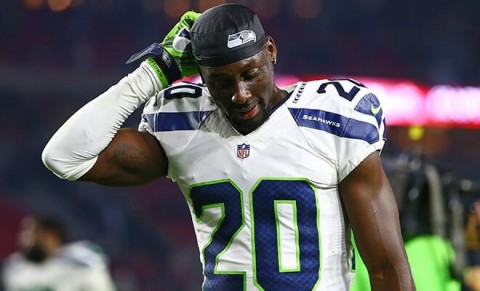.
Q. Does Jeremy Lane get a pass? Or is our 'recreational outrage' reserved for the 49ers?
A. I don't know that I'd characterize the SSI Kaepernick thread as overly emotional or motivated by indulgence. Seems more like intelligent discourse to me, responsibly carried out.
My own reaction to Jeremy Lane was just about the same as it was to Colin Kaepernick. Mostly, a roll of the eyes. There's a difference with Kaepernick, though. He has quite a bit of history, though, and chooses a pivotal moment (for him and the 49ers) to be controversial. Milton Bradley was a Mariner and I'd have regarded him as having burned a lot more of his political capital than (say) Taijuan Walker has.
.....
For sure there are police who adapt bully mentalities and wade out into the fray looking for a chance to crack heads. Such police, when they commit crimes, deserve long prison sentences. Such as the time Rudy Giuliani prosecuted one of his own NY cops for assaulting a black man with a nightstick and got him a 25-year prison sentence, which the ex-policeman is currently serving. And Guiliani had the entire precinct fired over that incident! From the top down, police on the street need a clear message that policies and procedures are important. My impression is that the vast majority ARE very careful about this.
It has been pointed out, Yes, American soldiers commit crimes, as Iraqi soldiers do. The difference is, when we find out about it, we prosecute. We've got different ideals.
.....
But my question with the BLM-style "keep the white cops from shooting our young black men" agenda is, Why not, at the same time, deal with the far more prevelant black-on-black violence? At the current time, a Chicago citizen is shot and murdered every 14 hours - rarely shot by the police and even more rarely, in a police-on-citizen "murder" case that holds up in court.
So why the hyper-shrill focus on only those incidents that are (say) 1-5% of the real problem? The BLM-style protests come off to many citizens, including me, as "Agitate against the police and be divisive" Matters than it comes off as "let's actually do something to better the lives of young black men." THIS comes off as the recreational outrage. Granted, when Colin Kaepernick donates $1M to community causes, it buys him a lot of credibility.
Jeremy Lane wants to point his finger at white cops and call them the big problem in racial relations in 2016. He doesn't say anything about the mobs in the streets chanting "What do we want? Dead cops! When do we want them? Now!" And why doesn't Lane comment on that? Because this is not an attempt to solve problems in an even-handed and systemic way.
Based on this type of one-sided agitation, I roll my eyes and consider Jeremy Lane part of the problem much more than he is part of the solution.
.....
What is the real fix? Maybe the problem is not lack of attention to the issue; how exactly are we supposed to pay any more attention to this than we're doing now?! And maybe the problem is also not a too-low level of tension between races.
Maybe the real fix is more along the lines of cell phone cameras and real prosecution where real crimes are committed. Maybe the fix is along the lines of, if a crime is committed, press charges and bring evidence. Oh, wait. Everybody does have a camera, and I missed the part where an epidemic of court cases blossomed. SO much easier to claim there's a genocidal epidemic than to simply YouTube it to everyone's satisfaction.
Jeremy Lane's fix for white-cop-on-black-male violence is greater visibility for the issue. :: shrug :: Maybe he's right; maybe if we yell at each other a little louder, things will get better. But while we do that, I would also be interested to know what his suggestions are, if any, to deal with black-on-black crime.
......
Hope that answers the (mostly fair) question. I think that most of the BLM-style protests are coming from a place that is not helpful. Kaepernick had dug himself a deep hole before he ever joined in, but he's also climbed a fair way out of it. I wasn't especially annoyed with either man in the first place, but am definitely concerned about where race relations are going in America.
My two cents.
Respectfully,
Jeff
